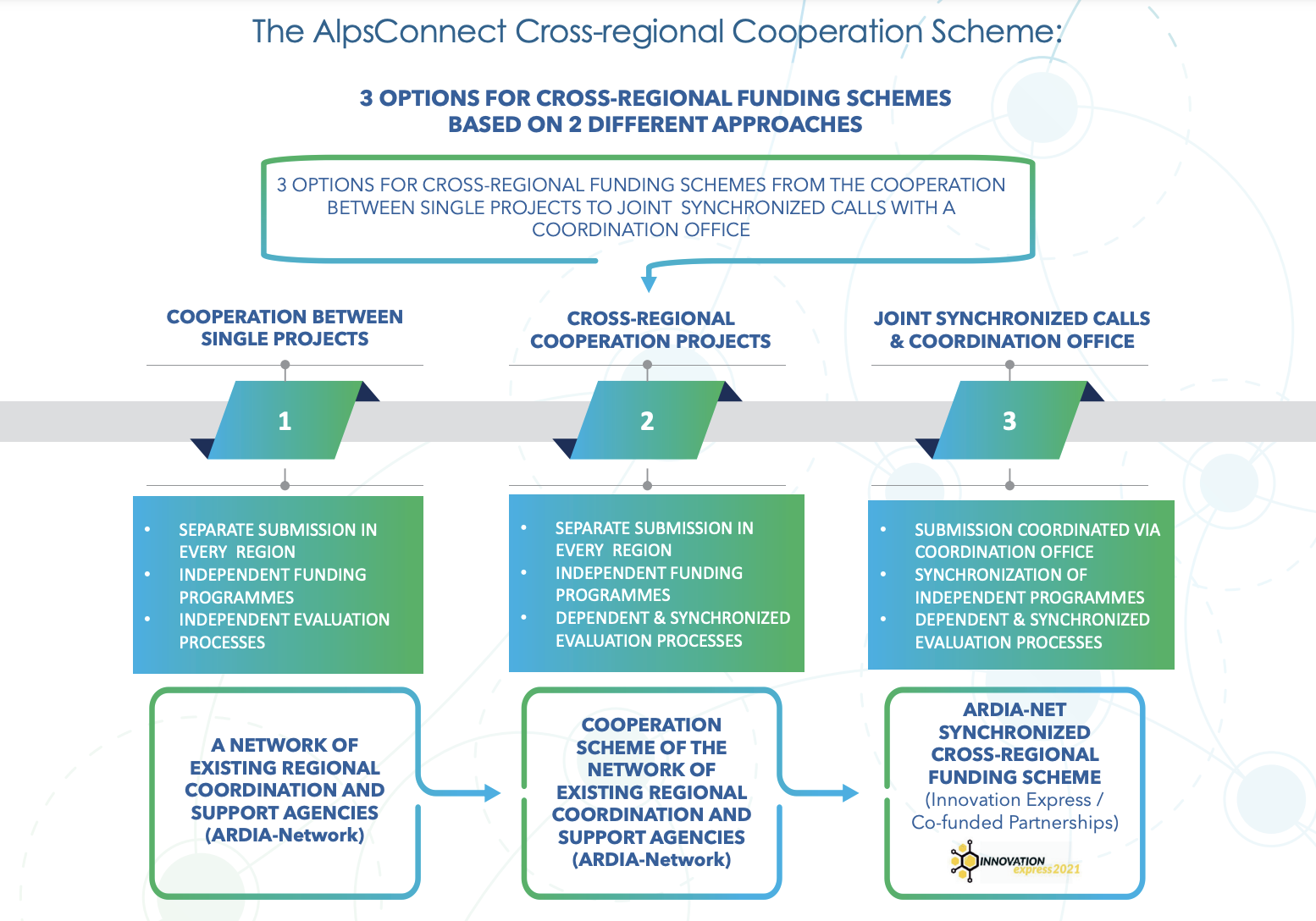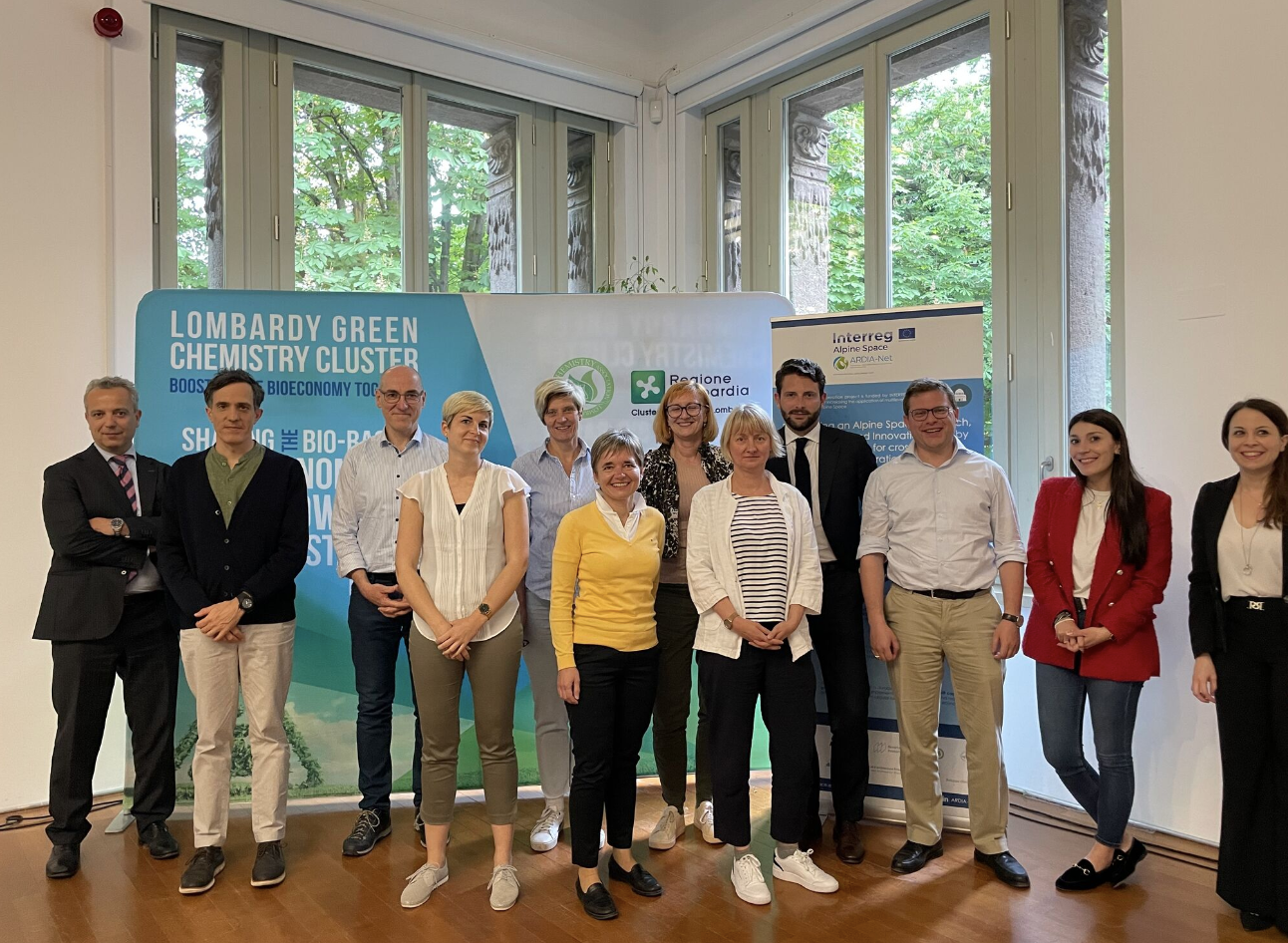Concluding conference of the ARDIA-Net Interreg project
On May 11, the concluding conference of the ARDIA-Net Interreg project took place with 18 in-person attendees in Milan and 18 online participants. The programme for the half-day event included presentations and two panels on the project results as well as discussions on further cross-regional cooperation.
The EU’s Strategy for the Alpine Region (EUSALP) sees the bioeconomy and the healthcare sector as strategically important future sectors. BIOPRO Baden-Württemberg GmbH was the lead partner in the ARDIA-Net project, which was co-financed by the EU and got underway in October 2019. The goal of the project was to develop a transnational funding programme for research, development and innovation (R&I) for governments in the Alpine macroregion, in line with the needs of EUSALP. ARDIA-Net made a positive contribution with some practical solutions for achieving better macroregional governance and support for sustainable development in the Alpine area. ARDIA-Net thus filled a gap in the European funding landscape, enabling solutions to be found for challenges that are common to the 48 regions in the Alpine area. In terms of content, the ARDIA-Net framework programme built on already established research, technology and innovation strategies (as well as the smart specialisation strategies, S3) of each region to ensure that specific funding lines were relevant to the individual regions.
ARDIA-Net enabled the partner regions to experience and develop new forms of cross-regional cooperation, learn from each other and envisage future scenarios and cooperative practices after the project ended. It also facilitated policy dialogue, awareness-raising when it comes to multi-level governance, and the transition to a new way of thinking about the planning, scope and design of joint R&I funding programmes. The project looked into programmes financed through regional funding, as well as those receiving support from the ERDF.
In the opening speech given by Prof. Dr. Kindervater (BIOPRO Baden-Württemberg GmbH, lead partner) at the concluding conference, it became clear how important cross-regional cooperation is in these extraordinary times (marked by COVID-19 and the war in Ukraine). Not so long ago, it was a question of where we bought our consumer goods, now we are asking whether we are able to buy them at all.
 The ‘AlpsConnect Scheme’ was developed within the ARDIA-Net project, and identifies three options for cross-regional cooperation. © ADRIA-Net (2022)
The ‘AlpsConnect Scheme’ was developed within the ARDIA-Net project, and identifies three options for cross-regional cooperation. © ADRIA-Net (2022)To facilitate cross-regional cooperation, the ARDIA-Net project developed the 'AlpsConnect Scheme', which offers three options to support cross-regional R&I cooperation, thus closing an existing funding gap. Impact and change cannot be easily quantified, but the organisation and implementation of the pilot call 'Innovation Express 2021' with the participation of four regions (Baden-Württemberg, Brandenburg, Canton Fribourg and Salzburg) has shown the extent to which the funds and instruments proposed by ARDIA-Net can be applied. Baden-Württemberg played a leading role in planning and implementing the funding call and two Baden-Württemberg companies were represented in project proposals. The first panel at the conference discussed the results of these two projects. All the signs pointed to what appear to be extremely favourable conditions for cross-regional cooperation, which would, however, require 'courageous regions' that are willing to invest money and time.
 The ARDIA-Net consortium consisted of eight project partners from seven regions. © ADRIA-Net (2022)
The ARDIA-Net consortium consisted of eight project partners from seven regions. © ADRIA-Net (2022)In the second panel, the focus of the discussion was on the political and strategic levels. Well-developed regions where the macroregional strategy has already established a link to operational programmes (e.g. through networks of managing authorities) have a clear competitive advantage, as some Baltic Sea regions have shown some time ago, e.g. the 'Baltic Sea Network - European Social Fund (BSN-ESF)'. Looking at the EUSBSR (European Union Strategy for the Baltic Sea Region), as a pioneer in this field, one of the future challenges for the EUSALP is to create an alpine-wide network of managing authorities, modelled on the Baltic Sea Network. This network would be aimed at continuously exchanging information on ongoing and upcoming funding programmes that can be synchronised. DG REGIO (European Commission's Directorate-General for Regional and Urban Policy) is already working to achieve this by setting up networks for funding issues. This is shaping up to be a useful step forward, inspired by the results of the ARDIA network, and could certainly make use of ARDIA’s work and know-how. The ARDIA network could identify and promote future R&I collaborations, manage matchmaking platforms (such as the one used in Innovation Express 2021) and facilitate contacts within and among regions.
BIOPRO Baden-Württemberg GmbH would like to thank all project partners and supporters for their excellent cooperation and work in implementing the project results.